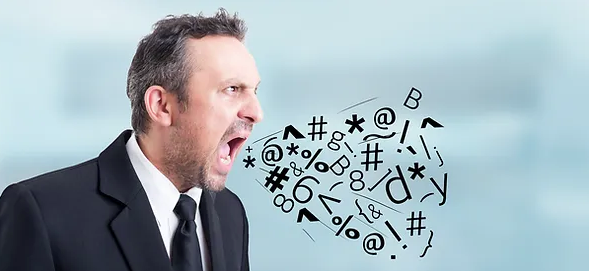I do not claim to be a subject matter expert nor a certified anything as it pertains to language. What I want to share is my view on the use of language and certain words which have become known as “Bad.”
To put it simply cussing is when a word or language offends someone.
When I was a child there were many words or phrases considered completely unacceptable. Today, much of this language has become relatively common place. So, I would like to share my humble opinion on how language, in general, should be properly utilized.
To illustrate my point let’s examine one word, in particular, as an example. There is a word we use today to describe poop or crap. Now the way “crap” got its name was the original English inventor of the flushing toilet. His name was John Crapper. So considering what people would use his invention for, it is not hard to see where we came up with that word. However, there is another word even older and is still considered a “bad” word today.
In the colonial days of America, the English settlers would occasionally need a little help with getting their fields and crops growing. Often the cattle and dairy farmers of England would gather up large quantities of the droppings from their livestock, and would have it shipped overseas as fertilizer.
Well anyone who has lived on a farm knows about this little bit of information; if you put large quantities of hay into a big stack, it has this strange ability to generate high temperatures as it slowly decays. Cow dropping shared this characteristic, and when piled or stored in a large quantity manure starts to generate high temperatures. In fact, if it were left alone long enough it would not only generate heat, but the moisture would eventually evaporate. It was then possible for these piles to catch fire. If this happened then, the fire would spread very rapidly as dried hay and manure are very flammable.
As you can imagine, a fire in the middle of the Atlantic on a wooden vessel with cloth sails was not something entirely desirable. To safeguard the vessel’s crew and cargo shipping companies starting putting limitations and standards on how to ship the fertilizer. First, you could only store so much of the material inside a single container. In smaller quantities, the material was much less likely to combust. As an additional safeguard, they would label the outside of the shipping crates with warning labels. These labeled read “Ship High In Transit,” as a warning to the crew they should not place this material at the bottom of the boat since it was flammable. This made it easier should they need to fight possible fires quickly, or dump the cargo overboard if it was getting out of hand.
The material inside the crates with this label, “Ship High In Transit,” became synonymous with the material contained inside. So, as a word itself, there is no malice or evil associated with the word. S.H.I.T. is merely an acronym for an early hazmat label.
Many times people will use this word in conjunction with an insult. For example calling someone a “Piece of S….,” maybe they are a “S…. head,” or they have “S….. for brains.” In this context we have no problem thinking of the word as a form of cussing.
What I often question is this. What if we took the same insults and used a more “acceptable” word?
How about calling someone a “Piece of Crap,” maybe they are a “Poo Poo Head,” or they have “Mush for brains.” Are we no longer cussing just because we have stopped using a particular word? Well if cussing is the use of words or language which is offensive I would be willing to say, once you hurled these insults at someone they may rightly ask you to stop cussing regardless of the word you chose to use.
I believe the words themselves are completely innocent, but that someone’s ill intent might very well cause issues which frustrate other people.
So, am I saying it is ok to use words such as the one I am discussing? Not at all. Again, what is cussing? Cussing is the use of words or language others find offensive. Maybe you are just describing where you have been the last five minutes. “Sorry, man. I had to take a S….”
The fact is because the word itself can cause offense to others, even if it has an origin with no malice attached to it, just using it is still cussing. It is cussing because just by using it I run the risk of offending someone who does not care for that word.
I am addressing this topic from the context of the “language” you use. I am NOT saying a viewpoint or opinion could still be offensive. I believe controversial topics may be discussed more productively when you present your views in language which is less offensive and more constructive.
Am I saying we need to hold our tongues all the time else we risk hurting someone’s feelings? Again, no.
In my opinion, the best way we can use our words is to speak the truth, and to do so in love.
Let us say I make a mistake, and someone looks at me after I have blundered and says “You’re so stupid!” Believe me, I am going to be offended, and I may even defend myself. However, if they looked at me and said “Man, that was stupid. Are you all right?” Now the conversation has changed entirely.
No, I am not stupid, but what I just did was pretty dumb. I cannot deny this because it is true. Moreover, there is a sincere concern for my well-being shown in love. So I may have to accept what I just did was, in fact, stupid and a mistake. Luckily the person next to me was kind enough to choose not to cuss at me.
I wonder what the world would be like if more of us were to choose the words we speak to our loved ones, or anyone for that matter, a little more carefully.
One more note. It has never been and will never be acceptable to take the Lord’s name in vain. That one is made pretty clear in our scriptures, immortalized in the Ten Commandments.
I want to throw this final caveat in here. I am not perfect on this particular topic. I just hope by desiring to achieve it, I can get a little better at it myself each day.
Language is how we convey thought. So, by choosing to share our thoughts in a true, sincere, and clean manor we encourage the same. In this way we can begin to open meaningful diologue. A diologue where the thoughts and ideas are the points of discussion, not the words used.



